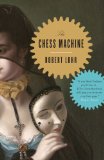Summary | Excerpt | Reviews | Beyond the Book | Readalikes | Genres & Themes | Author Bio

Critics' Opinion:
Readers' Opinion:
First Published:
Jul 2007, 352 pages
Paperback:
Sep 2008, 352 pages
 Book Reviewed by:
Book Reviewed by:
BookBrowse Review Team
Buy This Book
Venice: 1769
On an anonymous November day in the year 1769 Tibor Scardanelli had woken up
in a windowless prison cell, with encrusted blood on his swollen face and a
splitting headache. He groped in vain for a jug of water in the dim light. The
reek of alcohol on his ragged clothes turned his stomach. He dropped back on the
straw mattress and leaned against the cold lead of the wall. Certain experiences
in his life were obviously bound to recur—he was destined to be cheated,
robbed, beaten, arrested, and left to starve.
On the previous evening the dwarf had been playing chess for money in a tavern,
and he spent his first winnings on brandy instead of a proper meal. So he was
already drunk when the young merchant challenged him to play for a stake of two
guilders. Tibor was winning the game easily, but when he bent to pick up a
dropped coin, the Venetian put his queen back on the board, although she had
been taken long ago. Tibor protested, but the merchant wouldn't give way—much
to his companions' amusement. Finally he offered the dwarf a draw and took back
his stake, amid the laughter of the spectators. The alcohol had clouded Tibor's
reason. He seized the merchant's hand as it clutched his money. In the ensuing
scuffle he and the Venetian both fell to the floor. Tibor was getting the better
of it until one of the merchant's companions smashed the brandy jug over his
head. Tibor did not lose consciousness, even when the Venetians took turns
beating him up. After that they handed him over to the carabinieri, explaining
that the dwarf had cheated them at play and then attacked and robbed them.
Thereupon the carabinieri took him to the nearest prison, the leaden chambers of
the piombi at the top of the Doge's palace. Tibor's assailants had left him
neither what little money he had nor his chessboard, but at least his amulet of
the Madonna was still around his neck. He clutched it with both hands and prayed
to the Mother of God to get him out of this hole.
Before he had come to the end of his prayer, the jailer opened his cell door and
let a nobleman in. The man was about ten years older than Tibor, with an angular
face and dark brown hair receding at the temples. He was dressed à la mode,
without aping the foppishness of the Venetians: a nut-brown frock coat with
lace-trimmed cuffs, breeches of the same color tucked into tall riding boots,
and a black cloak over these garments. On his head he wore a three-cornered
hat, now wet with rain, and he had a rapier at his belt. He didn't look like
an Italian. Tibor remembered seeing him the night before among the guests in the
tavern. The nobleman was carrying a jug of water and a crust of bread in one
hand, and in the other a finely worked traveling chess set. The jailer brought
him a candlestick and a stool, on which he seated himself. The man put the
bread, water, and his hat down beside Tibor's mattress, and without a word he
opened the chessboard out on the floor and began setting up the chessmen. When
the jailer had left the cell again, closing the door behind him, Tibor could
bear the silence no longer and spoke to the newcomer.
"What do you want?"
"You speak German? Good." He took a watch out of his waistcoat pocket,
flipped it open, and placed it beside the chessboard. "I want to play a game
against you. If you can defeat me within a quarter of an hour, I'll pay your
fine and you're a free man."
"Suppose I lose?"
"If you lose," replied the man, when he had put the last chessman on the
board, "I'd be disappointed and you would have to forget you ever met me.
But if I may offer you a piece of advice: make sure you win, because there's no
other way you'll get out of this place. They've fitted a few more gratings here
since the Chevalier Casanova's time."
Excerpted from The Chess Machine by Robert Loer. Copyright © 2007 by Robert Loer. Excerpted by permission of Penguin Group. All rights reserved. No part of this excerpt may be reproduced or reprinted without permission in writing from the publisher.





The Flower Sisters
by Michelle Collins Anderson
From the new Fannie Flagg of the Ozarks, a richly-woven story of family, forgiveness, and reinvention.

The House on Biscayne Bay
by Chanel Cleeton
As death stalks a gothic mansion in Miami, the lives of two women intertwine as the past and present collide.

The Funeral Cryer by Wenyan Lu
Debut novelist Wenyan Lu brings us this witty yet profound story about one woman's midlife reawakening in contemporary rural China.
Your guide toexceptional books
BookBrowse seeks out and recommends the best in contemporary fiction and nonfiction—books that not only engage and entertain but also deepen our understanding of ourselves and the world around us.